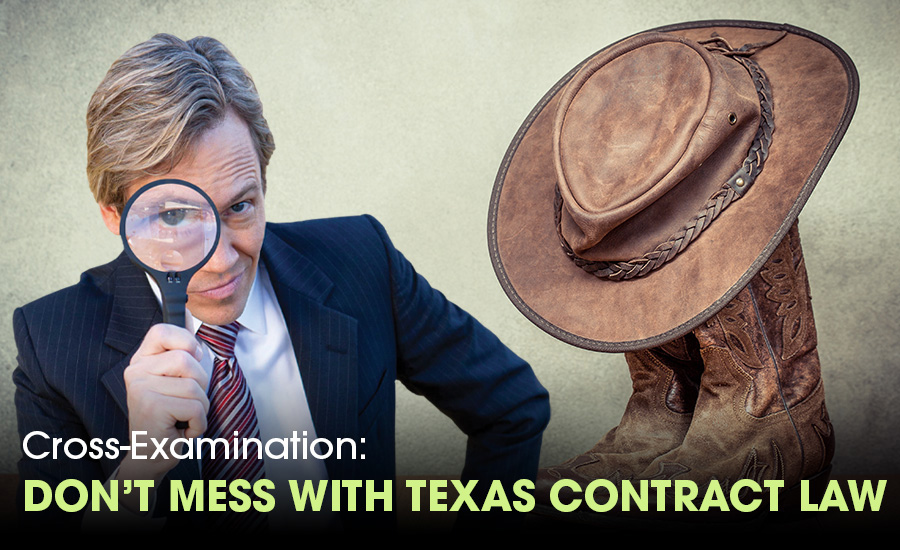Cross-Examination: Don’t Mess with Texas Contract Law
How to Prosper with Proper Documentation for CAT Losses

Photos credit: BrAt_PiKaChU/Stock / Getty Images Plus via Getty Images and Ed Crosss
“Don’t mess with Texas” has been the unofficial slogan of the Lone Star State since 1985. While the rest of the country thinks it’s just a catchphrase, true Texans know it actually began as an anti-littering campaign. The saying is especially fitting now because the State of Texas does not want remediation contractors littering the state with contracts that do not comply with its unique laws. These laws are traps for the unwary.
Follow the Special Rules for Disaster Remediation Contracts
Texas is the only state I know of that has a separate body of statutes specifically targeting “disaster remediation contracts.” The rules are very specific and have more twists than a pretzel factory, particularly when it comes to lien rights. The state is on the lookout for crooked contractors, and violators can land in the hoosegow.
In the aftermath of Hurricane Harvey, some contractors pressured Texans to provide upfront payments for work that was never performed. The state took a rather dim view of that, and made it a crime for a contractor to require full or partial payment before work is performed. Texas Disaster Remediation Contracts must state that the contract is subject to Chapter 58 of the Texas Business & Commerce Code, that the contractor may not require advance payments, and that progress payments must be in reasonable proportion to the amount of work actually performed, including materials delivered.¹ A violation of any of these requirements is deemed a “deceptive act” that may have serious legal consequences.
Contractors will march into Texas with good intentions and traditional work authorizations that fail to specify material terms, making them difficult or impossible to enforce. Think of a contract as a list of everything you would want a court to give you in the event the customer does not pay. If it’s not in a writing signed by the customer, the court probably won’t give it you. When a Texas judge sees an old fashioned work authorization, they’ll might think the contractor just fell off the turnip truck.
Contractors must provide their residential customers with a list of subcontractors, or get a waiver of the right to the list. However, most or all of the other requirements cannot be waived. Before a residential contract is executed by the owner, Texas requires the contractor to provide a written statement substantially similar to the text of Texas Property Code Section 53.255, indicating that:
- Texas law requires contractors to provide owners with an overview of their rights, responsibilities, and risks in the transaction.
- The contractor may not require the owner to convey the property to the contractor as a condition to the agreement to perform work.
- The owner should investigate the contractor and obtain references before signing the contract.
- The owner should insist on a written contract that explains what the contractor will do, when it will be done, and the cost of work or an explanation of how the cost will be determined.
Give Notice of the Right to Cancel
Consumers in Texas may cancel a consumer transaction up to three business days after signing the agreement. Contractors have to provide a notice of the right to cancel, and it must be in same language used in the principal sales presentation, e.g., Spanish. The form of the notice is dictated by the Texas Business and Professions Code and must be in boldface type in a minimum size of 10 points. The contractor must also provide a Notice of Cancellation form for customers to sign in the event they elect to cancel.
Hold Harmless Provisions and Releases of Liability
Texas courts generally don’t want you to hang your wash on someone else’s line. The EPA and OSHA, in addition to local and state authorities, have specific and stringent requirements for the removal of materials that contain lead and asbestos. Contractors should also follow the applicable federal and local regulations for preventing silica dust exposure to workers and occupants. In light of recent weather activity, when the restoration industry is overtaxed, there is a temptation to rush in without following proper procedures. Some jurisdictions require asbestos surveys and a notification process many days before work begins. Some good-intentioned contractors may try to expedite demolition projects by seeking waivers or releases of liability to skirt the rules. Not so fast! Some releases are enforceable in Texas, but many are not!
It is not unusual for businesses to seek releases of liability for negligence or even gross negligence. The more serious the wrong, the more difficult it is to be released from liability for it. Some courts in Texas believe that releases for gross negligence violate public policy and should not be enforced. Definitely ask for a release if the customer refuses your recommendations on an issue that could lead to secondary damage or bodily injury.
Releases are subject to the Texas Fair Notice Requirements, which essentially stands for the proposition that a business must have very good evidence that a customer was aware of a release and had a good understanding of what rights were being released. Written releases must be specific and conspicuous. This means that they must not be buried in fine print. A good practice is to put them in bold, capital letters. They must be presented in a way that would capture the attention of a reasonable person.
Add Some Teeth to Improve Collection Chances
Contractors have much better leverage in collections when their contracts contain provisions for attorneys’ fees, collection costs, late fees, service charges, and interest. Unlike many states, Texas has some serious teeth to its lien statute, which states that the court “shall” award costs and attorney’s fees in a lien foreclosure action.²
Customers Must Pay Deductibles
It’s a crime in Texas to pay or offer to pay policyholder’s deductible or to rebate all or part of a deductible. It’s also a crime for a policyholder to submit a claim for charges that have been padded to offset the deductible. Texas allows insurers to deny claims when the deductible is not paid. The deductible protects the carrier by ensuring the policyholder has some skin in the game. Contractors are coming to Texas in droves from all of the country, in response to the catastrophe resulting from the severe winter weather of 2021. Unfortunately, some of these contractors are “all hat and no cattle.”
The Texas Hold’em: Mechanic’s Liens
Of course, the most powerful collection tool is the mechanic’s lien. A lien is a legal hold on property to secure a debt. To fix a lien on Texas residential property, a written contract must usually be executed before the work is performed. Unlike any other state law I have seen, to protect the right to lien the home of a married person, the remediation contract must be signed by both spouses, even if the other spouse’s name is not on the property! Further, the contract must be filed with the county clerk where the homestead is located.³
Use Lump Sum Prices Whenever Possible
Everyone hates sticker shock. After decades of collecting money for remediation contractors, I cannot overstate the point that fixed price contracts are much easier to enforce than “time and materials contracts.” I
know what you’re thinking: “Ed, it’s impossible to state a price for emergency service before work begins!” I respectfully disagree. The problem is that emergency service work authorizations often obligate the contractor to return the property to its pre-loss condition. The price for that is usually impossible to accurately determine at the outset, but it’s not necessary to commit to that result the moment you walk on the job.
It’s totally unnecessary to scope an entire project just to start the stabilization process! The better approach is to go in stages, pricing each one as you go. Write a scope for an initial set of services that will definitely be necessary, and agree on a lump sum price for that. Explain that water damage is progressive, and establish an understanding that drying times are difficult to predict. Return on day two or day three, taking moisture meter readings, revisiting the scope and executing change orders as necessary to bring the project to conclusion. For example, an initial scope could be six air movers and a dehumidifier for three days, and ten labor hours for the lump sum price of x dollars, to be followed by a change order for additional services, if needed. If you have the customer’s agreement to the price for each stage of work, they have no argument that they “would not have hired you if they knew it was going to cost so much.”
Assignment of Benefits
A great way restoration contractors keep insurance companies honest is to obtain an assignment of rights under a claim. A properly drafted assignment allows the contractor to make a claim directly against an insurance company that would otherwise be impossible.
Most insurance policies contain provisions stating that the policies cannot be assigned. Most states do not apply these “anti-assignment” provisions to the assignment of rights under an individual claim. These are called “post-loss assignments of benefits.” Texas is in the minority of jurisdictions that apply the anti-assignment provisions to post-loss assignments, so the typical assignment of benefits probably will not work in Texas. However, Texas law allows the written assignment of an interest in a cause of action, which means that a contractor can receive the right to pursue a claim against an insurance company for breach of the policy.
Execution
Encourage customers to read the contract! Do not rush a customer into signing a contract. Texas is wary of contractors who get signatures on contracts with blanks in them, especially when the blanks are later filled in with terms that are not favorable to the customer. This can lead to severe legal consequences for the contractor, so simply don’t ask a customer to sign a contract with blanks in it. If space is inadvertently left blank, immediately bring this to the attention of the customer, explain how you believe the blank should be filled in, and try to reach an agreement, memorialized in a signed change order. In an impasse on a fundamental term of the contract, contact a Texas lawyer and discuss whether it is best for all concerned to cancel the contract.
Whether required by law or not, all restoration contracts should be in writing.⁴ Thorough communications and good contracts mirroring those communications greatly reduce the chance of conflict and collection problems.
This article is for general information and is not intended to be legal advice. Rather than relying on hearsay or entertaining magazine articles, to start getting the slack out of your rope, read the actual law. If you’d like a free copy of some of the important Texas rules for disaster remediation contracts, just send an email to EdCross@EdCross.com with “Texas Rules” in the subject line.
If you’re working on the 2021 Texas freeze, just remember: this ain’t their first rodeo. Git-R-Done!
Reference:
¹ Texas Business & Commerce Code Section 58.003
² Texas Property Code Section 53.156
³ Texas Property Code Section 53.254
⁴ This is not to say that the failure to execute a written contract will always deprive contractors of the right to payment in all jurisdictions.
Looking for a reprint of this article?
From high-res PDFs to custom plaques, order your copy today!










